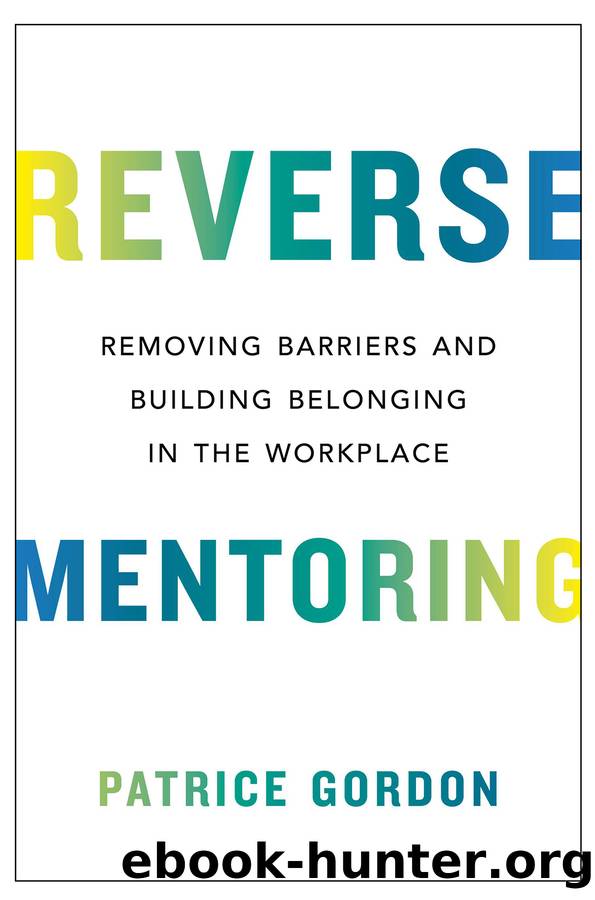Reverse Mentoring by Patrice Gordon

Author:Patrice Gordon [Gordon, Patrice]
Language: eng
Format: epub
Publisher: Hachette Books
Published: 2022-11-02T00:00:00+00:00
Best Practices
At your first meeting, you and your mentor will discuss your preferences for scheduling meetings, communication, and confidentiality (see Chapter 6 for more on this). But there are a few guidelines all mentees should keep in mind to ensure a productive relationship.
⢠Be punctual: This should go without saying, but as someone with a lot of responsibilities and demands on your time, you will most certainly be faced with scheduling challenges during the course of your mentoring relationship. But if you continuously show up late, leave early, or cancel meetings at the last minute, not only will you lose the opportunity to benefit from what your mentor has to teach you, but you also signal to them that you donât prioritize this relationship or respect their time. By extension, you communicate to the rest of the organization that you donât consider diversity, equity, and inclusion to be priorities, thus limiting your ability to be an agent of change and potentially sabotaging the larger DEI initiatives at the company. If you absolutely need to cancel, strive to give your mentor plenty of advance notice, and be sure to reschedule immediately. If youâre going to be late, make sure to let them know so theyâre not waiting around idly. The same goes for any follow-up youâre expected to do between sessions; deliver on your agreed commitments on time. Common courtesy can go a long way as long as you donât make discourtesy a habit.
⢠Inform your assistant: Because your assistant is likely the person responsible for managing your calendar, let them know that all reverse mentoring meetings should be prioritized and that the time should not be interfered with unless absolutely necessary. Make sure that they prioritize any messages from your mentor while respecting the boundaries of privacy and confidentiality you and your mentor set up in your first meeting (see Chapter 6).
⢠Reduce distractions during meetings: Turn your phone off and put it away while you are meeting with your mentor. If necessary, talk to your assistant about a way to get in touch with you in case of emergencies only, and determine in advance what constitutes an emergency. If you are meeting in the office, use a room that is discreet or, if thatâs not possible, turn your back to the window or door so youâre not distracted by people walking by.
⢠Schedule meetings mindfully: You know when you are most productive and when your energy levels are at their highest. You also know when you are less likely to have your day derailed by an emergency, a delay, or some other stressor. Schedule mentoring meetings with this in mind. Also consider your mentorâs schedule, time preferences, and personal commitments. High energy and few interruptions will create the space for a strong relationship to be formed with fruitful discussion, which will benefit both of you.
⢠Take notes judiciously: Mentoring sessions should feel as natural and informal as possible. You want to let conversation flow freely, as if you were having a chat with a friend.
Download
This site does not store any files on its server. We only index and link to content provided by other sites. Please contact the content providers to delete copyright contents if any and email us, we'll remove relevant links or contents immediately.
| Conflict Resolution & Mediation | Human Resources & Personnel Management |
| Knowledge Capital | Outsourcing |
Bullshit Jobs by David Graeber(4190)
Radical Candor by Kim Scott(2723)
I Am Right, You Are Wrong by Edward De Bono(2441)
23:27 by H. L. Roberts(2249)
Nomadland by Jessica Bruder(2063)
Average Is Over by Tyler Cowen(1848)
The Conflict Resolution Phrase Book by Barbara Mitchell & Cornelia Gamlem(1779)
Out of Our Minds: Learning to Be Creative by Ken Robinson(1745)
High-Impact Interview Questions by Victoria A. Hoevemeyer(1691)
Who Moved My Cheese?: An Amazing Way to Deal With Change in Your Work and in Your Life by Johnson Spencer(1648)
An Everyone Culture: Becoming a Deliberately Developmental Organization by Robert Kegan & Lisa Laskow Lahey(1644)
The Ideal Team Player by Patrick M. Lencioni(1642)
The Asshole Survival Guide by Robert I. Sutton(1598)
Automatic Society by Bernard Stiegler(1556)
Unleashed by Anne Morriss & Frances Frei(1540)
Who by Street Randy & Smart Geoff(1506)
42 Rules of Employee Engagement by Susan Stamm(1477)
96 Great Interview Questions to Ask Before You Hire by Paul Falcone(1452)
Fish! by Stephen C. Lundin(1405)
